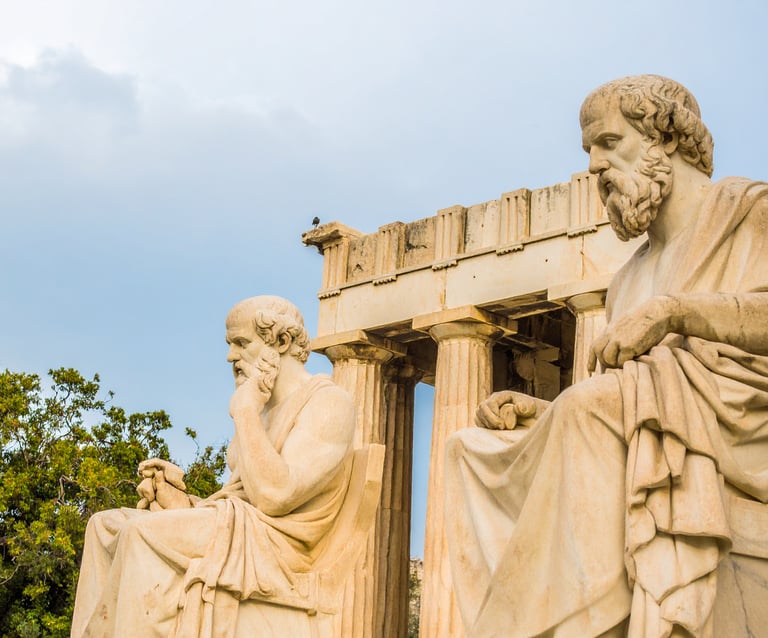UPSC Optionals PSIR: Explain Aristotle's critique of Plato's Idealism. (20 m- 2019)
"Plato is dear to me, but dearer still is truth." With this bold proclamation, Aristotle—the Peter who denied his master—challenged the very foundation of Plato's idealism. While Plato dreamt of perfect Forms and ideal states, Aristotle walked the earth, studying constitutions and urging practical governance. This blog explores the philosophical divorce between Plato and Aristotle, covering epistemology, politics, and the legacy of empiricism in modern thought. A must-read for UPSC PSIR aspirants to sharpen concept clarity and answer writing edge.
PSIR
7/26/20253 min read


👨🏫 Aristotle: The Peter Who Denied His Master
Though Aristotle was Plato’s brightest student, he radically departed from his teacher’s theories. While Plato is celebrated as the Father of Political Philosophy, Aristotle is known as the Father of Political Science, laying the groundwork for empirical and practical political thought.
🌌 Plato’s Idealism: Knowledge, Forms, and Utopia
Plato believed in a higher, transcendent reality—the World of Forms—where true knowledge (episteme) exists. For him:
The material world is a shadow, or imitation, of the real world of Forms.
For example: Things we call “beautiful” participate in the Form of Beauty.
These Forms are timeless, changeless, perfect, and knowable only through reason and dialectics, not the senses.
This idealism extends to his politics:
The ideal state must reflect the Form of Justice.
Rule by the Philosopher King ensures governance rooted in truth, not opinion.
🧪 Aristotle’s Rejection: The Third Man and Tabula Rasa
Aristotle launched a strong critique of the Forms, especially through his Third Man Argument:
If every object reflects a Form, and the Form itself must resemble an even higher Form, this leads to an infinite regress—making the theory logically unsustainable.
Instead, Aristotle proposed:
Forms exist within objects—they’re not separate, transcendent realities.
Knowledge begins with the senses, and is then processed by reason and induction.
The mind is a tabula rasa (blank slate), shaped by experience, not remembrance of eternal Forms.
He laid the foundation for empirical epistemology and scientific reasoning, rejecting Plato's mystical idealism.
🧭 Aristotle’s Political Theory: From Utopia to Reality
⚔️ Plato vs Aristotle on Politics:
1. Ideal State:
Plato: Advocates for rule by the Philosopher King. His ideal state is divided into rigid classes—rulers, auxiliaries, and producers—with each performing a fixed role.
Aristotle: Prefers a mixed constitution combining elements of monarchy, aristocracy, and democracy. He supports rule by the middle class as a stabilizing force.
2. View of Change:
Plato: Is deeply suspicious of change. He equates change with decay and believes in a static, ideal order.
Aristotle: Accepts change as a natural part of life. He argues that political systems must adapt to circumstances and the nature of citizen
.
3. Basis of Justice:
Plato: Justice is achieved when everyone performs their designated role in harmony with the whole—justice is social order.
Aristotle: Justice is rooted in virtue and is developed through participation in politics and the habituation of moral behavior.
4. Knowledge Source:
Plato: Emphasizes rationalism. True knowledge comes from intellect and understanding the eternal, unchanging Forms beyond the material world.
Aristotle: Emphasizes empiricism. Knowledge comes from sense perception, experience, and logical reasoning based on observed reality.
Aristotle criticizes Plato’s utopia as impractical and authoritarian. Instead, he proposes:
A Polity (mixed constitution) combining the best elements of democracy and oligarchy.
Governance based on the Golden Mean, avoiding extremes in policy and power.
Importance of middle class in achieving stability and justice.
🧠 Virtue Ethics: From Forms to Habituation
Where Plato tied virtue to knowledge of Forms, Aristotle grounded it in praxis:
Virtue is a habitual disposition, developed over time.
The moral path lies in the Golden Mean—the balance between excess and deficiency.
Example: Courage is the mean between cowardice and rashness.
Aristotle’s ethics—phronesis (practical wisdom) and eudaimonia (flourishing)—replaced Plato’s abstract ideals with human-centered morality.
🔁 Legacy: From Aristotle to Marx and Modern Empiricism
Aristotle’s move from idealism to empiricism influenced:
Hegel, who refines dialectics as a method for truth discovery.
Marx, who sees ideas as illusions masking real material conditions—flipping idealism on its head.
Modern empirical science and political realism, which rely on observation, pragmatism, and data, rather than utopias.
🧩 Conclusion: Why Aristotle Still Matters
Aristotle didn’t just reject Plato—he redefined the philosophical method. By rooting knowledge in experience and politics in practicality, he laid the foundation for modern science, constitutional theory, and virtue ethics.
Today, the Plato-Aristotle divide remains at the heart of debates between idealism and realism, moral absolutes and relativism, and utopia vs pragmatism in politics.
As UPSC aspirants, understanding this philosophical revolution offers more than theoretical insight—it sharpens your grasp of governance, ethics, and statecraft in today’s real world.
Also See:-
'Slavery is natural and beneficial both for the master and the slave.' (Aristotle) (1996)
Comment: "The polis exists by nature and that it is prior to the individual." (2002)
UPSC PSIR Optional: Locke’s Social Contract. (10M – 2022)
UPSC PSIR Optional: Hobbesian notion of Political Obligation. (10M – 2017)
UPSC Optional PSIR: State of Nature as State of War (Hobbes) (10M – 2023)
UPSC Optional PSIR: Critically examine Machiavelli's views on religion and politics. (15M – 2018)